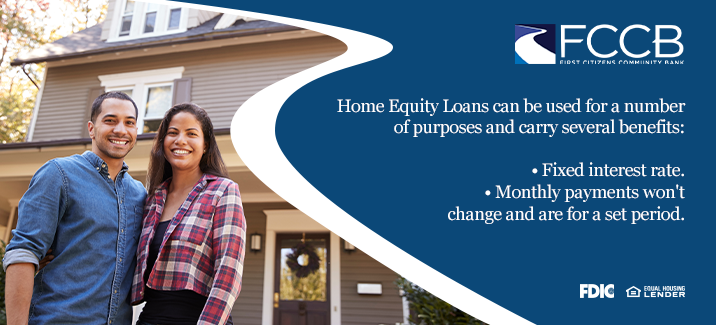Understanding the Difference Between HELOC & Home Equity Loans
Many times you will hear the terms Home Equity Loan and Home Equity Line of Credit (HELOC) used in conjunction—or even interchangeably. The terms are a little jargony, and outside of the banking industry, not many people can explain the difference. But despite the similar name, these two loan products are quite distinct, and your intended use of the funds will largely determine which one will better serve your needs.
In this post we’ll disseminate the differences between home equity loans and HELOCs, talk about the pluses and minuses of each kind of loan product, and break down what their best uses tend to be, playing on their unique characteristics. Keep reading to learn more and find out which one is right for you!
What is a Home Equity Loan?
A home equity loan uses the equity you have in your home—the value of your home minus what you owe on your mortgage—to serve as collateral for a new loan. Just as your home was the collateral for your initial mortgage, once you have paid off enough of your mortgage or your home has risen in value, you can harness that value to help you secure a loan with a lower interest rate than typical consumer loans. And, just like your initial mortgage, you will be responsible for paying fees and closing costs for a new home equity loan. In fact, home equity loans are so similar to mortgages that they are often referred to as a ‘second mortgage.’?
So how much can you borrow? Lenders will calculate what is called the ‘combined loan-to-value ratio’ or CLTV—the current value of all your loans against the house, divided by the current appraised value. As PocketSense explains, “This ratio provides a lender an insight to the risk of default that a loan to a particular borrower poses to the lender.” Since home equity loans borrow against the value of your home, you can never get one for more than that value, and usually for a little less. Most home equity loans are actually capped at about 80-85% of your equity, in order to avoid your loan going ‘underwater’ if the housing market fluctuates. For more information, visit our guide to home equity loans!

The Pros of a Home Equity Loans
There’s a lot to like about home equity loans. Here are some of their basic benefits:
- Low rates: Because you are using your home as collateral, rates are typically lower than other forms of financing, though they are usually slightly higher than current mortgage rates. This is because your mortgage is your primary loan, and if you experience financial difficulty and your home is foreclosed, that loan will be the first to be repaid (making your home equity loan a tiny bit more risky). However, that doesn’t mean that your home equity interest rate will be higher than your mortgage interest rate—that will depend entirely on when and where you got your initial home loan.
- Fixed rates: Home equity loans have fixed interest rates, which means your payments won’t go up over the life of the loan.?
- Tax deductible: Just like your mortgage interest, home equity loan interest can be tax deductible, as long as you use the funds to make improvements on the home that secures the loan. How do you know if your use of the funds counts for a tax deduction? The IRS uses the phrase “buy, build, or substantially improve” to test whether a use of a home loan qualifies for a tax deduction.
- Extremely flexible: While it isn’t always advisable to put your home on the line for purchases that don’t add value to it, you don’t need to use the funds to make improvements on your home. You can use a home equity loan as a low-interest option to fund other major purchases and costs. This is particularly beneficial when you can save a significant amount of money by taking advantage of the low interest rate of a home equity loan over other forms of borrowing.
The Cons of a Home Equity Loan
It’s important to also consider the downsides of home equity loans, to ensure that they are the right choice for you. Here are some of the cons:
- Your home is on the line: As we mentioned above, putting your home up as collateral for purchases that don’t add value to your home isn’t always a good idea. That’s because, if you are unable to make payments on your home equity loan, you could end up losing your home.
- You need to know how much to borrow in advance: Since home equity loans are distributed in one lump sum, you will need to know to a fairly accurate degree how much you will need to borrow. If you don’t know an exact amount, or don’t need to borrow the full amount at once, a home equity line of credit might be a better choice (more on this below).
- Stricter credit requirements: It’s not unusual for home equity loans to require higher credit scores than traditional mortgages—they’re slightly riskier from the lender’s perspective. Additionally, there aren’t special first-time homebuyer program equivalents for home equity loans. To qualify for a home equity loan, you’ll have to prove you can handle an additional loan.
Popular Uses of a Home Equity Loan
Home equity loans are fairly flexible in what they can be used for, but there are some common things that borrowers tend to do with their funds. These include:
Home Improvements: This is the most common use of home equity loans, and potentially the smartest. And if your home improvements add value to your home, that means you will have even more instant equity. As mentioned above, when used for home improvements, the interest is tax deductible.?
Debt Consolidation: If you have high-interest loans and credit card debt that keeps growing due to those exorbitant rates, a home equity loan with a lower interest rate could help stem the bleeding, lower your monthly payments, and allow you to gain back control over your debt. However, if you can’t make your home equity loan payments, keep in mind that your house could be at risk. You can use our Debt Consolidation Calculator to see how much money you could save with a low-interest home equity loan.?
Big One-Time Expenses: If you have a large, single upcoming expense, using a home equity loan to pay for it, rather than credit cards or a consumer loan, could be a cheaper option. Common one-time expenses include wedding costs, large emergency home repairs, education expenses, and large medical bills.
Business Expenses: Starting a new business or expanding an existing one will often depend on financing. But business loans can have higher interest or be difficult to qualify for. If you are a business owner, you might use a home equity loan as an affordable way to pay for an investment in your business. Just keep in mind that if your business experiences problems, you will still be responsible for paying the loan—or risk losing your home.?
What is a HELOC?
A HELOC, short for ‘home equity line of credit’, also utilizes the equity in your home to secure your loan and is often used by homeowners for home improvements. But aside from those similarities, the ways you will receive and pay back those borrowed funds with a HELOC is quite different from a home equity loan.
A HELOC is a revolving line of credit. Like a credit card, there is a maximum amount of money you can borrow (often 80-85% of your home value). In this way, you don’t receive a lump sum of money as you would with a home equity loan, but instead borrow as you need.?
HELOCs usually have two phases: one where money is drawn, as needed, from the line of credit, and one where it is paid back. Draw phases typically last ten years and you may be required to only make payments on interest during this period (though you are welcome to start paying back as much and as early as you can!). Repayment phases are often 20 years, making the total duration the same as a traditional home loan (30 years).

The Pros of a HELOC
HELOCs have a lot of pluses, over-and-above home equity loans in some cases. Here are some of the bonuses of using a home equity loan:
- Low interest rates: Typically on par with conventional mortgages, and a little lower than home equity loans. You also have the added bonus of only paying interest on what you use, as you use it, vs. paying interest on the full sum from the start.
- Tax deductible: As long as you use the funds for home improvements (remember, “buy, build, or substantially improve”), you can write them off during tax time.
- Only borrow what you need: If you do not need all the funds up front, or aren’t sure of the total amount of money you will require, a HELOC may be the way to go. The less you are able to borrow, the lower your payments and interest will be.
- Flexible repayment options: Your initial payments can be quite low, and you usually aren’t required to pay back principal (the money you borrowed) until the repayment phase kicks in. However, you can always pay off or pay down your HELOC early, saving even more money on interest.
The Cons of a HELOC
Like home equity loans, there are some potential downsides to HELOCs, although they are largely on a case-by-case basis. Here are some things to watch out for:
- Interest rates are variable: While rates tend to be low, they are tied to market rates. This means that your initial rate could go up over time. The flipside is also true—if market rates go down, so will your interest rate.
- Your home is used as collateral: Just as with a home equity loan, you are using your home to secure your HELOC. Your home ensures that even if you fail to make payments, the lender will be able to be paid back, even if that means foreclosing on your home to get the funds. However, as WalletHub explains, foreclosures on HELOCs are rare: “Because they are so unlikely to receive much repayment from a foreclosure, your HELOC lender may be open to setting up a structured repayment plan [instead].”?
- Risk of overspending: As a line of credit, much like a credit card, there may be a greater risk of overspending above and beyond your needs. But unlike a credit card, your home is on the line if you do. Use your HELOC funds with care, and limit their use to your initial purpose for taking it out.
Popular Uses of a HELOC
Borrowers tend to use HELOCs for specific purposes that take advantage of their flexible borrowing and repayment terms. Here are some of the types of expenses that HELOCs are popularly used for:
Home Improvements: The most common and perhaps best-advised use of these loans, a HELOC can be used to fund home improvement projects, additions, and renovations. The benefit of using a HELOC over a home equity loan is that you can borrow a little bit at a time, to pay for each phase or home improvement bill, rather than borrow a large sum of money at once. Why is this so useful? For starters, you will only pay interest on the amount you borrow—as you borrow it—reducing the overall amount of interest you will pay. But perhaps more importantly, you don’t need to have an exact figure in mind when you apply. This means that if a project goes a little over (or under!), you won’t be stuck with the consequences of not borrowing the exact right amount.
Education Expenses: Although some will use a home equity loan to pay off large student loans after completing a degree, HELOCs are useful to pay for expenses as you go. If you or a member of your family is pursuing higher education, a HELOC can be used as a flexible way to fund education expenses, including tuition, room and board, books, and other living expenses, and at lower rates than student loans and credit cards.
Debt Consolidation: Like a home equity loan, if you have a lot of high-interest debt, a HELOC can be a good way to reign in this debt and consolidate it under a single umbrella. Because initial payments are low, it can be easier to cover them during the initial phase. And the low interest rate of a HELOC can help you save a lot of money over high-interest debt. But—and this is a big caveat—if you struggled to manage revolving credit (i.e., credit cards) in the past, putting your home on the line to pay off your debt might not be the wisest move?

Which one is right for you?
Now that you know the ins and outs of each product, you might have a pretty good idea of which one best suits your needs. However, if you still aren’t sure, the best thing to do is consult with your local lender. Finding a reliable financial partner that makes fast, local decisions on your loans can help you get started right away—and save you money, too. As Investopedia explains, “for loans under $100,000, a small community bank or credit union will [also] offer the best deal.”
When you’re ready to start funding your dream renovations, pay off high-interest debt, make that big purchase while saving money on interest—or just explore your home equity lending options—reach out to our lending team at First Citizens Community Bank to see what we can do for you. Visit our Home Equity Loans page to learn more about our loan and line of credit options, use our handy home improvement and debt consolidation calculators, or apply for your new loan!


